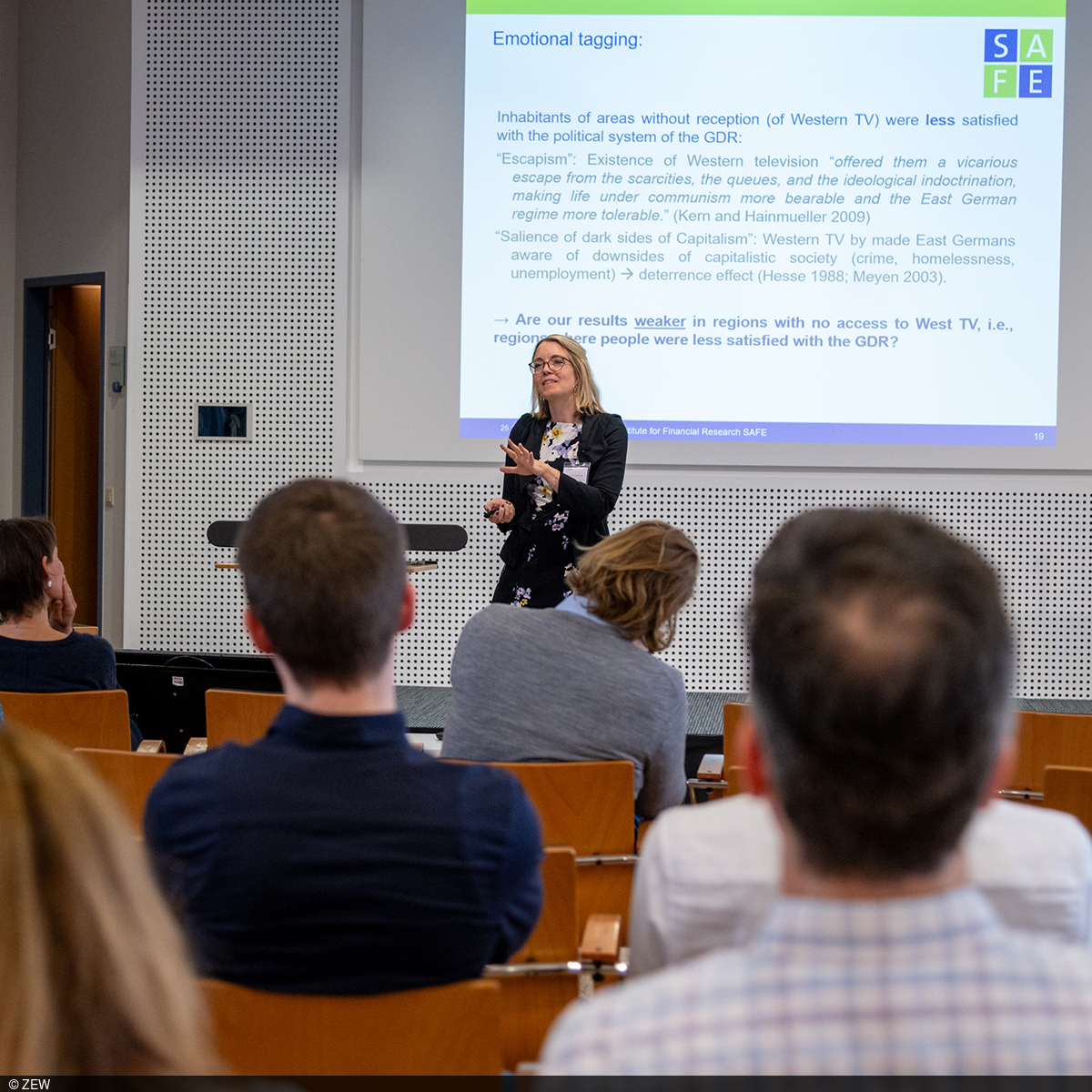The Influence of Demographics and Climate Change on the Decisions of Financial Market Actors
ConferencesInternational Conference on Ageing and Sustainable Finance at ZEW Mannheim
On 25 and 26 April, ZEW Mannheim hosted a conference on the topic of “Ageing and Sustainable Finance”. The conference focused on the question of how demographics and climate change influence the decision-making of key actors in the financial market. Furthermore, it addressed the specific challenges and effects for retirees, employees, homeowners, heirs, private investors in general, banks, asset managers and companies.
In addition to three keynote speeches by leading experts in life-cycle finance, household finance and banking, the event featured presentations and discussions on fourteen selected research papers. ZEW welcomed speakers from eight different countries.
Wealth effects and households’ sustainable investment decisions
The opening speech was delivered by Tobias Berg, professor of banking at Goethe University Frankfurt. Berg underscored the importance of decarbonizing the housing sector, which currently accounts for a quarter of global carbon emissions. He delineated two key factors critical for capital markets to effectively propel the green transition: Firstly, financial markets must incentivise energy efficiency investments by substantially reducing the cost of capital. Secondly, Berg explained that an individual household’s decision to invest in energy efficiency measures is heavily contingent upon their level of wealth. He substantiated this assertion by demonstrating that households with low to moderate wealth exhibited a higher propensity to adopt green heating systems upon receiving an inheritance. Berg emphasised that financial constraints serve as a significant barrier for many households seeking to make investments in energy efficiency.
(Non-)participation in the stock market
The second keynote, “(Mis-)Perceptions about Investing”, was delivered by Professor Christine Laudenbach from the Leibniz Institute for Financial Research SAFE and Goethe University Frankfurt. She gave a broad overview of her own work as well as other current literature which tries to answer the following research question: “What determines (non-)participation in the stock market and asset allocations?” According to Laudenbach, there are a lot of potential determinants. An interesting example she provided was the difference in stock market participation between former East and West Germany. In this case, the exposure to communism and resulting positive or negative emotional tagging influence participation rates. Moreover, Laudenbach talked about qualitative evidence that she collected using semi-structured interviews, an approach not commonly used in finance. She stated: “We talk to people and try to learn more about potential barriers to stock market participation”. Major misunderstandings seem to exist about how financial markets work. Interestingly, these misperceptions are prevalent among non-investors and investors alike.
Great regret about lack of savings in old age
On the second day of the conference, Professor Axel Börsch-Supan (Munich Research Institute for the Economics of Aging and SHARE Analyses, Max Planck Institute for Social Law and Social Policy, and NBER) shed light on the pressing issue of under-saving for old-age provision. In his keynote speech, “Saving regret and sustainable pensions”, he highlighted several possible reasons for under-saving, including procrastination, insufficient knowledge, computational difficulties in determining savings amounts, and unanticipated crises on the individual and macro levels. Börsch-Supan emphasised the importance of understanding social security and pension benefits and making informed saving decisions. He also presented evidence that under-saving generally leads to regret, and he cautioned against overly simplistic narratives around procrastination. He also underscored the importance of considering other dimensions of human error, including underestimating the probability and impact of shocks in one’s lifetime. Börsch-Supan’s insights underscore the complex issue of under-saving for old-age provision and emphasise the importance of sustainable pensions as a solution to ensure the well-being and financial security of individuals in their later years.
International conference with international topics
Throughout the conference, fourteen researchers presented selected papers on topics such as households’ and firms’ sustainable investment and saving decisions, the measurement of financial institutions’ climate risks, and retirement savings. The following questions were also discussed:
- Do investors perceive sustainable investments as a luxury good? Are sustainable assets used to offset investors’ carbon footprints? How do temperature shocks affect investment decisions?
- How do households evaluate the morality of corporate actions including those related to ESG? How does competitive pressure affect the ESG performance of companies? How do start-ups choose between ESG- and profit–driven investors?
- To what degree are banks and insurers exposed to physical risks and risks associated with climate change?
- What is the impact of financial advice on voluntary pension contributions? How strongly are financial choices of households related to risk and time preferences?
- How does career choice affect life expectancy? How do survival expectations and cognitive abilities influence households’ investments in risky assets?
The conference granted guests an outstanding opportunity to discuss the interconnection of two of the major long-term macroeconomic trends, demographic change and climate change, and to exchange ideas with researchers interested in these topics from all over the world.









